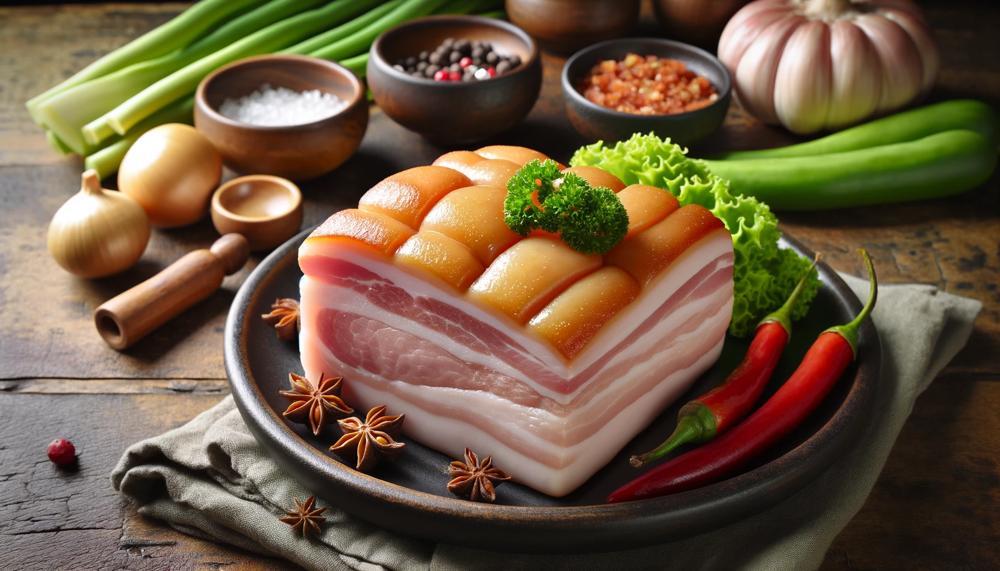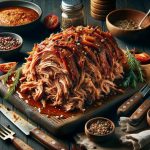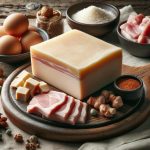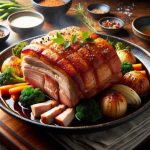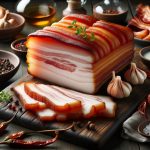Are you tired of constantly being warned to avoid fat in your diet? Well, it’s time to challenge that notion and open up your mind to a new perspective. Pork fat, also known as lard, may have been given a bad reputation in the past, but it’s actually a surprisingly healthy ingredient with numerous benefits for your well-being. Yes, you read that correctly.
This often-misunderstood fat is brimming with essential nutrients that can positively impact your overall health. Don’t believe us?
Here are just a few reasons why pork fat should be welcomed back into your kitchen:
- Despite common misconceptions, pork fat is not all bad for you. In fact, it contains a balanced mix of monounsaturated and saturated fats.
- Lard is an excellent source of vitamin D, which is crucial for maintaining strong bones and teeth.
- It also boasts high levels of oleic acid, which has been linked to lower rates of heart disease.
- With its abundance of antioxidants, pork fat can help combat inflammation and protect against certain diseases.
- Additionally, this flavorful fat provides a sustainable source of energy and can keep you feeling satisfied for longer periods of time.
Before you dismiss pork fat as unhealthy or unappealing, consider these impressive health benefits.
Keep reading to discover more about how incorporating lard into your diet can make a positive impact on your overall well-being.
Contents
What Is Pork Fat?
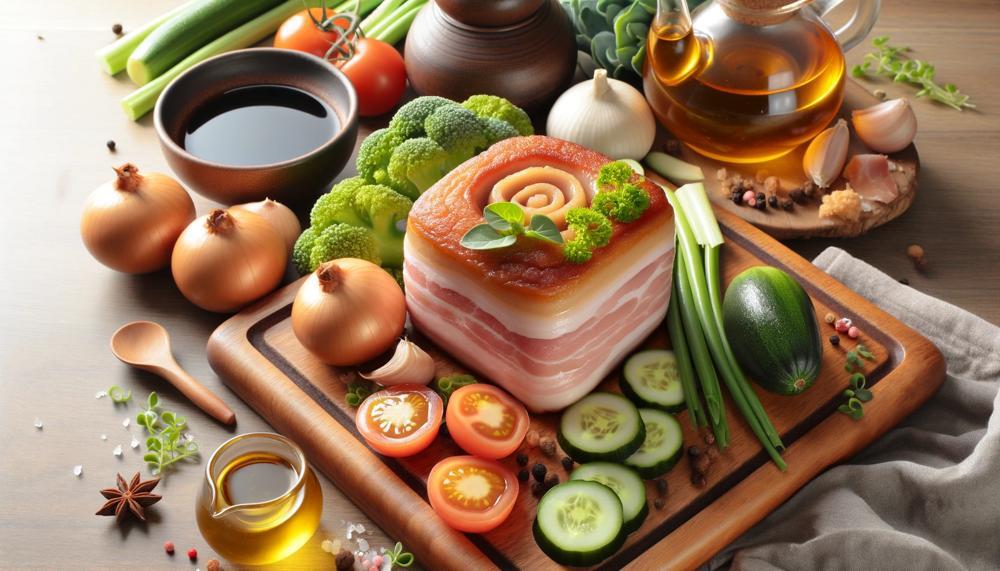
Pork fat, also known as lard, is the purified and rendered fat from pigs, which has been a key ingredient in numerous cuisines across the globe for centuries. However, due to its high saturated fat content, it has garnered a negative reputation.
Recent studies have shown that not all saturated fats are the same and that pork fat may provide potential health benefits when consumed in moderation and from reputable sources.
Some of the potential health advantages of pork fat include:
- High levels of monounsaturated fatty acids (MUFA), which have been linked to improved insulin sensitivity, reduced inflammation, and better cardiovascular health.
- Small amounts of polyunsaturated fatty acids (PUFA), which are essential for our bodies and help decrease the risk of chronic diseases.
- Higher levels of omega-3 fatty acids in pasture-raised pigs, which possess anti-inflammatory properties and are vital for our overall well-being.
However, it is important to note that processed pork products often contain unhealthy additives and preservatives that can counteract any potential health benefits. Hence, it is crucial to select high-quality, organic, and pasture-raised pork products when incorporating pork fat into your diet.
How Can You Render Your Own Pork Fat At Home?
It may seem difficult to render your own hog fat at home, but with these simple instructions, you can do it and enjoy the advantages of cooking with homemade lard. To start, make sure the pork belly you choose has a healthy proportion of fat to lean flesh. Next, slice the pork belly into more manageable chunks. For best results, make sure the pork belly is completely dry before slicing.
After that, either roast the pig fat at 300°F (150°C) for about an hour, or melt it in a saucepan over low heat. This methodical melting procedure guarantees a smooth consistency and complete rendering of the fat. You could see contaminants coming to the surface as the fat melts. For a purer, cleaner final result, just skim them off with a spoon or ladle.
After removing all of the contaminants and melting all of the fat, pour the liquid into a clean container by straining it through cheesecloth or a fine-mesh strainer. This guarantees a clear and smooth lard by assisting in the removal of any leftover contaminants. After letting the fat cool and harden, put it in an airtight container and refrigerate for up to six months.
What Are The Different Types Of Pork Fat?
There are two kinds of unsaturated fats: monounsaturated and polyunsaturated. Avocados, olives, and olive oil are rich sources of monounsaturated fats. Polyunsaturated fats include omega-3 fatty acids, which are essential for our bodies but must be obtained from food since our bodies cannot produce them on their own. These essential fatty acids have been linked to improved insulin sensitivity, reduced inflammation, and better heart health.
However, it is essential to note that not all saturated fats are created equal. The quality of pork fat is heavily dependent on how the animals are raised and fed.
Pigs that are raised in pasture-based systems and fed a natural diet tend to have higher levels of beneficial omega-3 fatty acids in their fat.
What Are The Health Benefits Of Pork Fat?
The topic of pork fat has sparked controversy in the health and nutrition world, with some believing it to be detrimental due to its high saturated fat content. However, recent studies have revealed that pork fat does in fact offer some benefits for our well-being, as long as it is consumed in moderation.
A rich source of vitamin D:
Pork fat is packed with vitamin D, a vital nutrient for maintaining strong bones. This powerful vitamin aids in the absorption of calcium and promotes bone growth, reducing the risk of conditions like osteoporosis.
Contains oleic acid:
Pork fat is a great source of oleic acid, a monounsaturated fat that has been linked to lowering cholesterol levels and improving heart health. It also helps to lower blood pressure, making it particularly beneficial for those with hypertension.
Enhances cognitive function:
As a key component of the brain, fat plays an important role in boosting cognitive function. Pork fat provides essential nutrients and supports the production of neurotransmitters, which are responsible for communication between brain cells.
Boosts immune system:
Pork fat contains essential fatty acids that are crucial for the production of hormones and cell membranes, which are essential for immune function. Including pork fat in your diet can help strengthen your immune system and protect against illnesses and diseases.
Rich in B vitamins and minerals:
Compared to lamb or beef fat, pork fat is more unsaturated and healthier, providing various B vitamins and minerals such as iron, zinc, and selenium. These nutrients are crucial for maintaining good overall health and preventing deficiencies.
In conclusion, while it is important to consume pork fat in moderation to avoid excessive intake of saturated fats, it does offer several health benefits that make it a valuable addition to a healthy diet.
What Are The Culinary Uses Of Pork Fat?
Pork fat, also known as lard, tallow, or butterfat, is a versatile ingredient that has a wide range of culinary applications. From adding flavor to dishes to providing moisture, pork fat plays a vital role in many cooking techniques. In this section, we will delve into the diverse uses of pork fat in cooking and the advantages of incorporating it into your diet.
Types of Pork Fat:
- Lard: This type of pork fat has a high smoke point, making it perfect for frying and grilling. It is commonly used in dishes such as fried chicken, French fries, and pie crusts.
- Tallow: With a lower smoke point than lard, tallow is better suited for baking and stable fats. It can also serve as a base for sauces and gravies.
- Butterfat: Also known as schmaltz, this type of pork fat is widely available and can be used in various dishes like roasts, stews, and sautéed vegetables.
Benefits of Using Pork Fat:
- Nutrient-dense: Pastured pigs’ pork fat contains elevated levels of beneficial nutrients such as vitamin D and iron, necessary for bone health and immune system support.
- Heart-healthy: Contrary to popular belief, pork fat contains monounsaturated fatty acids that can help reduce cholesterol levels and lower the risk of heart disease.
- Versatile: Pork fat can be utilized in various cooking methods such as frying, sautéing, roasting, or baking. It can also be used to make sausages and cured meats or even non-food items like candles or soap.
What Are The Environmental Impacts Of Pork Fat Production?
Pork fat production has a negative impact on the environment, leading to deforestation, contaminated water and air, and a restricted water supply. Raising pigs contributes significantly to climate change and the loss of biodiversity since it requires large tracts of land, produces greenhouse gases, and contaminates water supplies.
When it comes to the manufacturing of hog fat, environmental effects are crucial to take into account. Even though many people may not be aware of how big of an impact these consequences have, they nevertheless need to be considered. Pig production requires a lot of land, which is one of the major problems with pig farming.
Due of their high growth and spatial requirements, pigs need cleared acreage for housing and feed production. Deforestation may ensue from this, which weakens trees’ ability to store carbon and damages natural ecosystems, exacerbating climate change.
Furthermore, pig raising generates a lot of greenhouse gasses, such nitrous oxide and methane. These gases cause climate change and global warming by trapping heat in the atmosphere and contributing to the greenhouse effect. Furthermore, improper management of pig excrement may pollute water bodies, hurting aquatic life and causing pollution. Water shortage may also result from this, as tainted water is unfit for agriculture or human usage.
Even though many people may not be aware, it is important to comprehend how the manufacturing of hog fat affects the environment. We may lessen these effects and save the environment by cutting down on our use of pig products or by developing more environmentally friendly manufacturing techniques. When it comes to how much food we eat, we have the ability to make more ecologically beneficial decisions as consumers.
In a nutshell
In a nutshell, incorporating pork fat into your diet can have both positive and negative effects on your health. On one hand, it is a valuable source of essential nutrients such as protein, iron, and B-vitamins. However, overindulging in pork fat may increase the risk of cancer and bacterial infection. To reap the benefits of pork without potential drawbacks, it is advised to choose lean cuts of minimally processed pork and consume them in moderation.
To further dissect the health implications of consuming pork fat, please refer to the table below:
| Health Benefits | Drawbacks |
| – Valuable source of protein for building muscle – Contains vital nutrients like iron and B-vitamins – May assist in weight loss |
– Excessive consumption may heighten risk of cancer – Can be contaminated with harmful bacteria – Processed pork products may contain additives like nitrates and nitrites |
Additionally, pork fat has been linked to potential environmental impacts such as deforestation, greenhouse gas emissions, and water contamination. It is crucial for individuals to be mindful of these ramifications and make more sustainable choices in their dietary habits.
Conclusion
In conclusion, pork fat, also known as lard, has long been unjustly vilified as an unhealthy fat. However, recent research has shed light on its surprising health benefits that have been overlooked for far too long. This misunderstood fat contains a well-balanced mix of monounsaturated and saturated fats, making it a valuable source of essential nutrients such as vitamin D and oleic acid.
But the benefits don’t stop there. Pork fat is also rich in antioxidants, which can help combat inflammation and protect against certain diseases. In addition, this versatile fat provides sustainable energy and can keep you feeling satisfied for extended periods of time.
While moderation is key due to its high saturated fat content, choosing pork products from reputable sources can make it a healthy addition to your diet. Opting for organic, pasture-raised pork not only allows you to enjoy the potential health benefits but also supports ethical and sustainable farming practices that contribute to a healthier planet.

